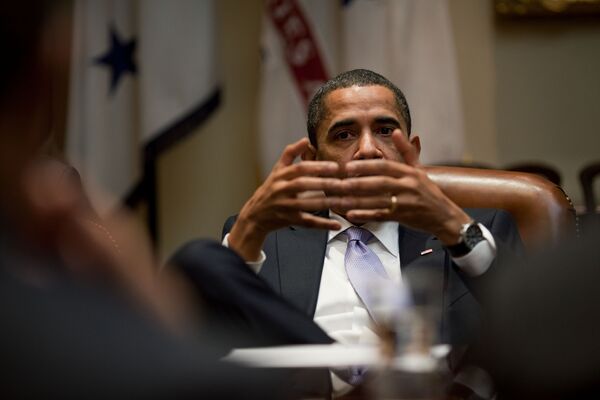MOSCOW. (RIA Novosti political analyst Dmitry Kosyrev) - In his first State-of-the-Union address U.S. president Barack Obama used his most powerful weapon, the gift of eloquence. Reporting on it, the Washington Post wrote that "the president came on strong, breathing fire before the assembled members of the House and Senate."
Obama did not apologize for anything, nor did he admit any failures of his first year in the White House. He made it clear that his election slogan about "change we can believe in" remains on the agenda. America will change.
Americans have unanimously responded to Obama's 71 minute-long address. They agree that the first year was not very successful for the president; it is good his resolve has not broken down and he is still committed to his promise of change.
What caused the setbacks? In general, Obama is facing the same problems as his predecessors in similar conditions, for instance Franklin D. Roosevelt, who came to the ruins of the Great Depression and whose performance also looked disheartening at first. Obama's rating has been affected accordingly. However, America's current problems are very specific and they have nothing to do with Obama.
In October 2008, 58% of Americans "strongly disapproved" of George W. Bush's policy. Others disapproved less strongly; still others had doubts and so on. Obama was elected on the wave of this discontent just because he was not Bush (judging by the polls, Republican nominee John McCain was considered a replica of Bush). However, now the same discontent with "the state of the union" is working against Obama. This is why his rating is decreasing, and not just because he has not yet found his way round Washington's bureaucratic labyrinths.
Americans are dissatisfied with everything: 56% criticize the package of injections into the economy ($787 billion), which has launched the recovery from the crisis in the United States and the rest of the world; 55% want the president to start working on healthcare reform from scratch. The ratings of Obama and the Democratic Party are falling but those of the Republicans are even lower. A few years ago Japanese were depressed as much. Under Mikhail Gorbachev the attitudes of the voters could be at best described as "mass-scale madness." America is going through a systemic crisis and only later historians will be able to determine when life was at its worst: before JFK's presidency in the 1950s or during the Vietnam war in the late 1960s or at the beginning of this century. Now Obama will have to continue his reforms in these conditions.
Most Americans take the president's address as something of a sport. Has he figured out how to push his bills through or not? Will he lose the forthcoming elections to Congress? Is he down in the dumps or still going strong? The rest of the world has a different view of this speech, in which Obama spoke a little about everything. For instance, it is interesting to see what Obama is going to do, what he will focus his efforts on. This primarily depends on the budget although he will make a separate speech on this subject.
It transpires that Obama has curtailed virtually everything. In his address he specified when the American troops will be withdrawn from Iraq and Afghanistan. Their withdrawal will save America $250 billion over a period of ten years. Obama is going to spend more on education. This is the only item that has grown by a substantial 6.2%. The White House is asking for more appropriations on the entire system from primary schools to universities.
It will cost $4 billion to destroy the system of testing high school students' academic progress, which is similar to Russia's Unified State Exam. This system is an American problem of long standing. Under Bush attempts were made to make it universal for all schools when it became clear that such education is good for nothing. Obama is going to encourage private schools and will make the government, not banks, invest primarily into education. The main goal of the reform is to raise the level of education and diversify ways of obtaining it with a view to raising general educational standards in America.
Obviously, Americans are more interested in Obama's statements on 10% unemployment and in the life of the middle and working classes in general. Recently Democrats lost Massachusetts, their key state, because of these problems. However, the rest of the world doesn't blame the failures in American policy under Bush only on the choice of the wrong team for the White House. After all, half of all U.S. citizens voted for this team and its ideology. Which makes it their fault.
Strictly speaking, it is the fault of the "average" voters, their limited views of the outside world and America's role in it, as well as the media, which had no faith in the intellect of their audience and preferred to paint a simplistic picture. We could even say that it is the fault of the whole humanities sphere because a smart country would not have had a president like Bush and would not have tolerated his setbacks.
Obama's intentions to upgrade the education system increase the value of shares of "corporation America." This is exactly the "change we can believe in." But this change will take place only in the long term. An immediate goal should be to prevent the turbulence in American minds from obstructing the president's reforms.
The opinions expressed in this article are the author's and do not necessarily represent those of RIA Novosti.



